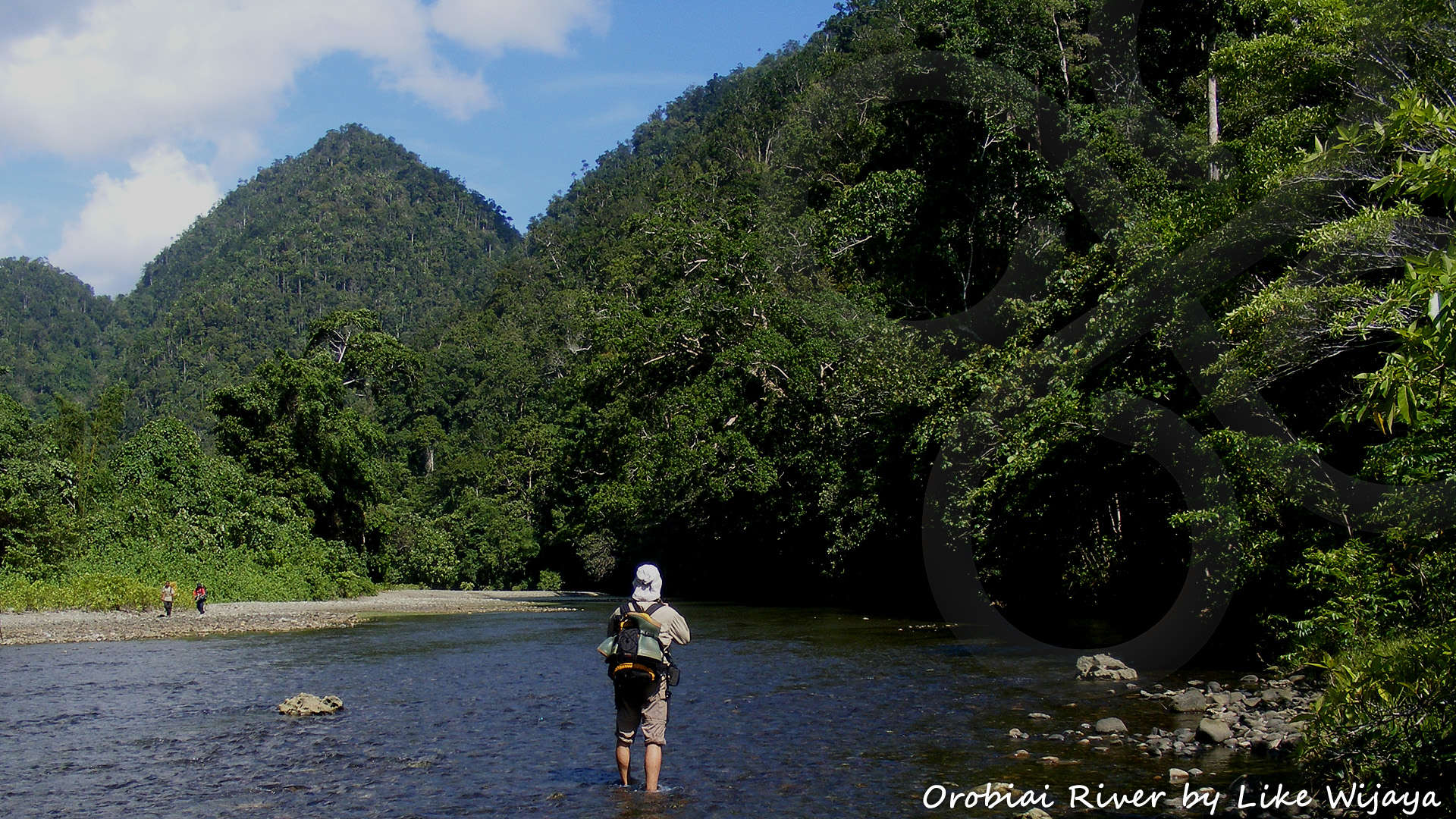View of the Orobiai River on the largest Raja Ampat island of Waigeo in eastern Indonesia. Copyright © Like Wijaya
Released February 2, 2009
Papua Expeditions (EKONEXION) and customary landowners on Waigeo Island in the fabled Raja Ampat archipelago of eastern Indonesia proudly announced that, as of January 1, 2009, they have entered into an ambitious and innovative five-year pilot agreement to preserve for future generations, the entire Orobiai River catchment in Waigeo's eastern half: 92 square kilometers of virtually untouched primary forest, set in visually stunning topography, and teeming with spectacular yet globally threatened wildlife.
This Community Conservation and Ecotourism Agreement (CCEA) seals direct annual quid pro quo payments by Papua Expeditions (EKONEXION) to customary landholding groups on Waigeo in return for both carefully defined conservation outcomes as well as the exclusive access and selective management rights required by the private ecotour outfitter in order to operate small-scale and essentially non-invasive ecotourism activities in a way that these can support the company's contractual financial obligations toward the landowners.
Foremost protected through this CCEA is the entire catchment area of the Orobiai River, encompassing 92 square kilometer (9,225 hectare) of heavily forested land and clear water draining directly into the Orobiai itself or via any of its tributaries, out of the surrounding Rabia and Mumes Hills and Mount Danai, to discharge into the Rabia Strait.
The Orobiai catchment harbors the paramount breeding population of Waigeo's endemic megapode, the enigmatic Bruijn's Brushturkey Aepypodius bruijnii (Endangered according to IUCN 2008), and holds good numbers of the endemic Waigeo Cuscus Spilocuscus papuensis (Vulnerable). The area is a haven for regionally endemic or restricted-range yet globally threatened birdlife such as the Western Crowned Pigeon Goura cristata (Vulnerable), the Brown-headed Crow Corvus fuscicapillus, and the Wilson's Diphyllodes respublica and Red Bird-of-paradise Paradisaea rubra (all Near-threatened).
Concretely, the CCEA proactively bans all forms of deleterious resource extraction and stops or otherwise restricts current traditional usage throughout the Orobiai catchment. Subsistence gardening is being extinguished over the period of natural soil exhaustion, the use of traps and ground snares is absolutely forbidden, and parforce pig-hunting is restricted to bottom-valley forest below 100 m elevation and 12 hunts per year. 'The long-term vision is to give the entire Orobiai catchment back to nature': explained Like Wijaya, Founder of Papua Expeditions (EKONEXION).
In a series of consultative meetings, landowners consistently advanced support for tertiary education as the single-most urgent avenue of expenditure for compensation payments. The CCEA thus stipulates that all payments are to be used toward education, structures timing of annual payments to coincide with the onset of the academic year in Indonesia, and applies appropriate financial reporting duties toward the end of each financial year.
The long-term vision is to give the entire Orobiai River catchment on Waigeo back to nature.
'We are well aware of the potential problems associated with unfair use and distribution of funds, as well as the inherent risks of linking conservation to giving money in itself': said Wijaya. 'That's why our financial compensations are contingent upon performance, both in terms of their specified usage, as the direct and immediate conservation returns expected from our investment.'
Structured advance payments only directly benefit customary landowners, but through the deployment of our ecotourism activities we endeavor to create dignifying employment opportunities for entire communities around the Orobiai catchment. 'We act on the convincingness of the added value of at least attempting to make conservation efforts more market-driven, and it is this synergy between accepted 'conservation incentives' and 'green premium' approaches that makes our CCEA pretty unique': added Wijaya.
Finally, this CCEA is the vision of Papua Expeditions (EKONEXION), but it is the company's varied international clientele which ultimately turned this vision into reality. 'We thank everyone who has been our guest over the past three years and just by participating in our tours contributed immensely toward the fruition of this CCEA': said Wijaya. 'In particular, we thank Mrs. Elizabeth Fikejs of Chicago (USA) who made a generous additional financial contribution toward supporting this initiative. But our greatest debt is with Mr. Yohanis Goram Gaman, Secretary of the Ma'ya Tribe Customary Right Council. Without his continuous support, encouragement and voluntary dedication, this agreement may never have come into existence.'
Additional information
The conservation value of the Orobiai River catchment on Waigeo can hardly be overstated. In addition to the suite of endemic and restricted-range, globally threatened wildlife highlighted above, it is worth mentioning here that the area boasts the full spectrum of elevational and thus vegetational gradients for (karstic) limestone and volcanic landforms on the island. Moreover, the catchment is continuous with a c. 1,000 square kilometer, heavily forested and trackless expanse including the ultramafic complexes of Mounts Nok and Sau Lal-Waimila, and the Mnier-Werar Hills.
The Orobiai catchment would surely merit recognition by BirdLife International as part of a larger Important Bird Area (IBA) that ideally would include much of Waigeo's eastern half. The catchment is a quintessential priority area for bird conservation within BirdLife's 'West Papuan Lowlands' Endemic Bird Area (EBA 172), as well as, all evidence suggests, a key area for terrestrial conservation within WWF's 'Vogelkop-Aru Lowland Rain Forest' Ecoregion.
The idea to make direct payments for environmental services, including biodiversity conservation, is evidently not new. In fact, there is reasonable consensus that a contractual approach over public provision of conservation through so-called 'conservation concessions' (also known as 'conservation incentives') is cost-effective and efficient, yet the implementation of applied schemes in Indonesia has been lagging behind.
The accepted concept usually involves a public agency or non-governmental organization acting as the honest broker to mediate between environmental service sellers (landowners and local communities) and takers (conservation investors). Key to the problem then is that the latter investors tend to get cold feet for varied reasons that are reducible to contractual incompleteness, and hence an inevitable free-riding effect results.
In the specific context of a remote area like the Orobiai catchment, where environmental problems are yet uncomplicated, and customary landowners generally exhibit positive conservation attitudes and exercise strong control over land and resources, this CCEA adds valuable elements to the debate. First and foremost, the knowledge that the strictly necessary opportunity cost of conservation (the cost required to convince landowners) can be modest enough to enable corporate ecotourism to play an active role in the development of meaningful conservation agreements. Second, that quid pro quo payments to landowners are then being backed-up by a sustainable income-generating mechanism with dignifying employment opportunities for entire communities. Third, and perhaps best of all, that such market-driven initiatives are fully complementary and can be expected to yield similar conservation outcomes to public or charitable conservation projects but without affecting public or charitable budgets.
This CCEA is a bottom-up initiative departing from the observation that customary landholding groups on Waigeo effectively control vast tracts of intact forest, and when complying with destructive resource users, exercise the equally observable capacity to irreversibly destroy globally significant patterns of biodiversity which until recently were broadly sustained through traditional land tenure.
Conservation and donor agencies alike tend to assess customary landownership by indigenous peoples as the primary source of contractual incompleteness within the context of conservation concessions, and hence the need of government leverage over eventual disputes is automatically assumed. Following the devolution of power in Indonesia, it is argued that the observable legal vacuum which results from an ongoing tug-of-war between the various hierarchical levels of governance, in fact introduces a far greater moral hazard and impediment to conservation investment.
Whether it be for destructive resource use or, at the opposite end of the spectrum, the restriction or complete cessation of traditional usage under the terms of a conservation agreement, customary landowners and local communities, as rural poor, invariably end up paying the highest price for the limitation of their customary property rights. As a starting point, any direct payment scheme for environmental services should thus by priority focus toward the people intrinsically connected to the land and biodiversity at stake. Nevertheless, Papua Expeditions (EKONEXION) views this CCEA as an opportunity to 'learn while doing' and as a complementary form of engagement to be used in the context of other natural resource management or sustainable development initiatives, and thus most definitely not as an attempt to bypass governments.
Ultimately, this CCEA is a strategic 'insurance premium' against potentially irreversible loss of a spectacular component of Earth's living diversity contained within the Orobiai River catchment, in anticipation of a supporting top-down initiative.
Related links
❯Read on about the birdlife of Waigeo Island.
❯Read on about the first photographs taken of Bruijn's Brushturkey in the wild on Waigeo Island on a PE exploratory bird tour.
❯Read on about our short birding break to Waigeo Island.
❯Read on about our prolonged birding expeditions visiting Waigeo Island.


